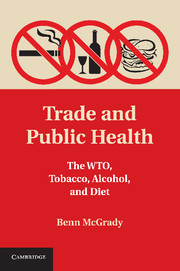Book contents
- Frontmatter
- Contents
- Preface
- Abbreviations
- 1 Intersections between Trade and Noncommunicable Disease
- 2 Normative Integration: Using Health Instruments in Interpretation of the WTO-Covered Agreements
- 3 Freedom to Use Taxes, Subsidies, and Restrictions on Marketing
- 4 Necessity and Regulatory Autonomy under the GATT
- 5 Product Regulation and Labeling Measures under the SPS and TBT Agreements
- 6 Reallocating Authority at the International Level: Delegation, Legalization, and Harmonization
- 7 Conclusion
- Glossary of Basic Trade Terms
- Bibliography
- Index
4 - Necessity and Regulatory Autonomy under the GATT
Published online by Cambridge University Press: 03 May 2011
- Frontmatter
- Contents
- Preface
- Abbreviations
- 1 Intersections between Trade and Noncommunicable Disease
- 2 Normative Integration: Using Health Instruments in Interpretation of the WTO-Covered Agreements
- 3 Freedom to Use Taxes, Subsidies, and Restrictions on Marketing
- 4 Necessity and Regulatory Autonomy under the GATT
- 5 Product Regulation and Labeling Measures under the SPS and TBT Agreements
- 6 Reallocating Authority at the International Level: Delegation, Legalization, and Harmonization
- 7 Conclusion
- Glossary of Basic Trade Terms
- Bibliography
- Index
Summary
It was concluded in Chapter 3 that facially neutral measures to address the public health implications of tobacco-, alcohol-, and dietary-related diseases may violate a number of prohibitions in the covered agreements. Depending on the circumstances, differential taxation may lead to violations of Article III:2 of the GATT, the Agreement on Agriculture, as well as give rise to countermeasures under the SCM Agreement. In addition, prohibitions on product promotion and advertising could conceivably violate Article III:4 of the GATT and Article XVI of the GATS if a WTO Member has scheduled commitments with respect to advertising or retail services.
When the circumstances are such that a violation may be made out, lawfulness of the measures in question will turn on application exceptions such as Article XX(b) of the GATT and Article XIV(b) of the GATS. At first glance, it appears that the permissive content of the WTO-covered agreements, as reflected in these provisions, provides sufficient protection to enable effective and comprehensive public health protection. This conclusion finds support with respect to origin-neutral advertising bans and taxation measures in Thailand – Cigarettes. In addition, the outcome of recent disputes suggests that, in practice, WTO panels and the Appellate Body show a high degree of deference to the regulatory choices of WTO Members. This deferential practice arguably began with the weighing and balancing approach set out by the Appellate Body in Korea – Various Measures on Beef and can be traced through disputes such as EC – Asbestos to more recent decisions such as Brazil – Retreaded Tyres.
- Type
- Chapter
- Information
- Trade and Public HealthThe WTO, Tobacco, Alcohol, and Diet, pp. 130 - 169Publisher: Cambridge University PressPrint publication year: 2011

